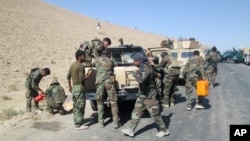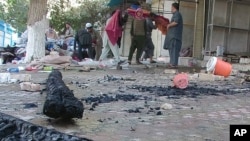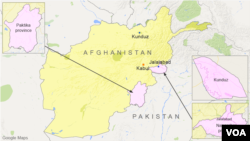Authorities in Afghanistan say that at least 60 people have been killed and 466 wounded in the battle between government troops and the Taliban for control of the northern city of Kunduz. Continued clashes were reported overnight and Friday morning in and around the beleaguered city.
President Ashraf Ghani announced late Thursday that Afghan security forces, after heavy fighting, recaptured most of Kunduz three days after the provincial capital fell to the Taliban.
However, authorities and residents in Kunduz say some Taliban fighters are still holed up in civilian homes and fighting Afghan forces who are conducting house-to-house clearing operations. The militant group also overran a separate district in northeastern Badakhshan province overnight.
ICRC concerned
A health ministry spokesman said Friday the government has been sending surgical teams and medical supplies to Kunduz. But the International Committee of the Red Cross (ICRC) says it is increasingly concerned about the welfare of civilians and the lack of medical supplies and personnel in the city of around 300,000 people.
In a statement issued Friday, the ICRC said it has emergency medical supplies ready to be flown from Kabul as soon as security at the city’s airport improves.
"We call on all parties to the conflict to ensure the safety of the civilian population and to facilitate the work of those trying to provide humanitarian support to the people," it quoted ICRC’s Afghanistan head, Jean-Nicolas Marti as saying.
Broader fighting
Officials in Badakhshan province said the Taliban there captured Warduj district in overnight fighting. Taliban spokesman Zabihullah Mujahid said its fighters killed more than 50 Afghan soldiers before overrunning the district. The province shares a border with Tajikistan, Pakistan and China’s restive Xinjiang region.
Fighting between Taliban fighters and Afghan security forces is also taking place in parts of neighboring Takhar and Baghlan provinces.Afghanistan's northern regions have remained relatively peaceful during the 14-year NATO-led combat mission that ended last December. Fighting was centered in southern and eastern Afghanistan, which are considered strongholds of the Taliban.
Separately, in eastern Jalalabad city, a U.S. military transport aircraft went down just after midnight killing 11 people on board. The Taliban claimed it shot down the plane. A coalition spokesman described the crash as an accident, saying there were no reports of enemy fire.
Pakistan blamed
Afghanistan's intelligence agency and the defense ministry have accused neighboring Pakistan’s spy agency, the ISI, of being behind the insurgent assault on Kunduz.
Local media quoted Afghan National Army deputy chief of staff General Murad Ali Murad, who is in Kunduz, as saying that “the battle was planned and executed from Pakistan by ISI.”
Pakistani minister Abdul Qadir Baloch, who also looks after affairs of Afghan refugees in the country, has rejected the charges.
“There is a blame game which is going on which is very unfortunate. I think that this is because of misunderstandings, maybe at the Afghan end,” Baloch told VOA.
Brutality in Kunduz
A statement from Ghani’s office said that while in Kunduz “the Taliban have resorted to extrajudicial killings of civil and military individuals and residents of Kunduz as well as torturing and harassing them.”
It charged that the Taliban “resorted to rape, and set free the prisoners, most of whom had been convicted of murder or violation of people’s dignity and property.”
The statement went on to say the insurgents “looted the belongings and properties of United Nations offices, other NGOs, consulates and representations of foreign countries.”
It condemned the Taliban activities as “crimes against humanity” and vowed to bring the perpetrators to justice.
Abuse from both sides
Amnesty International has also reported harrowing stories emerging from Kunduz residents, including mass murder, gang rapes and house-to-house searches by Taliban death squads.
Taliban spokesman Zabihullah Mujahid rejected the allegations as baseless in a Pashto language statement issued to VOA.
The independent Afghanistan Analysts Network (AAN) has cited its own findings that even before the Taliban assault, Kunduz residents were being subjected to illegal taxation, robbing and rape at the hands of the region's "abusive commanders" and local Afghan police.
"It was not so much that the Taliban were attractive, but rather that the pro-government militias and Afghan local police have behaved so badly as to make the state look unattractive," said the Kabul-based group.






